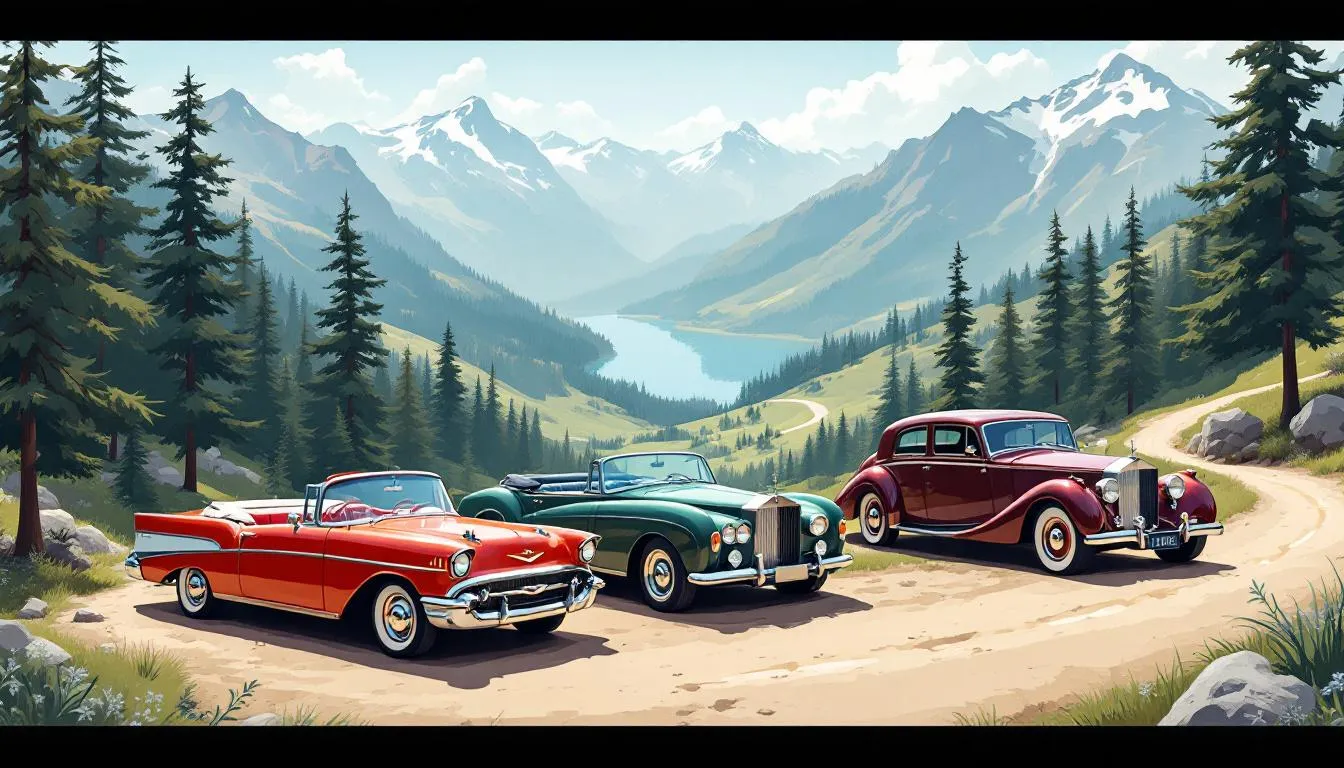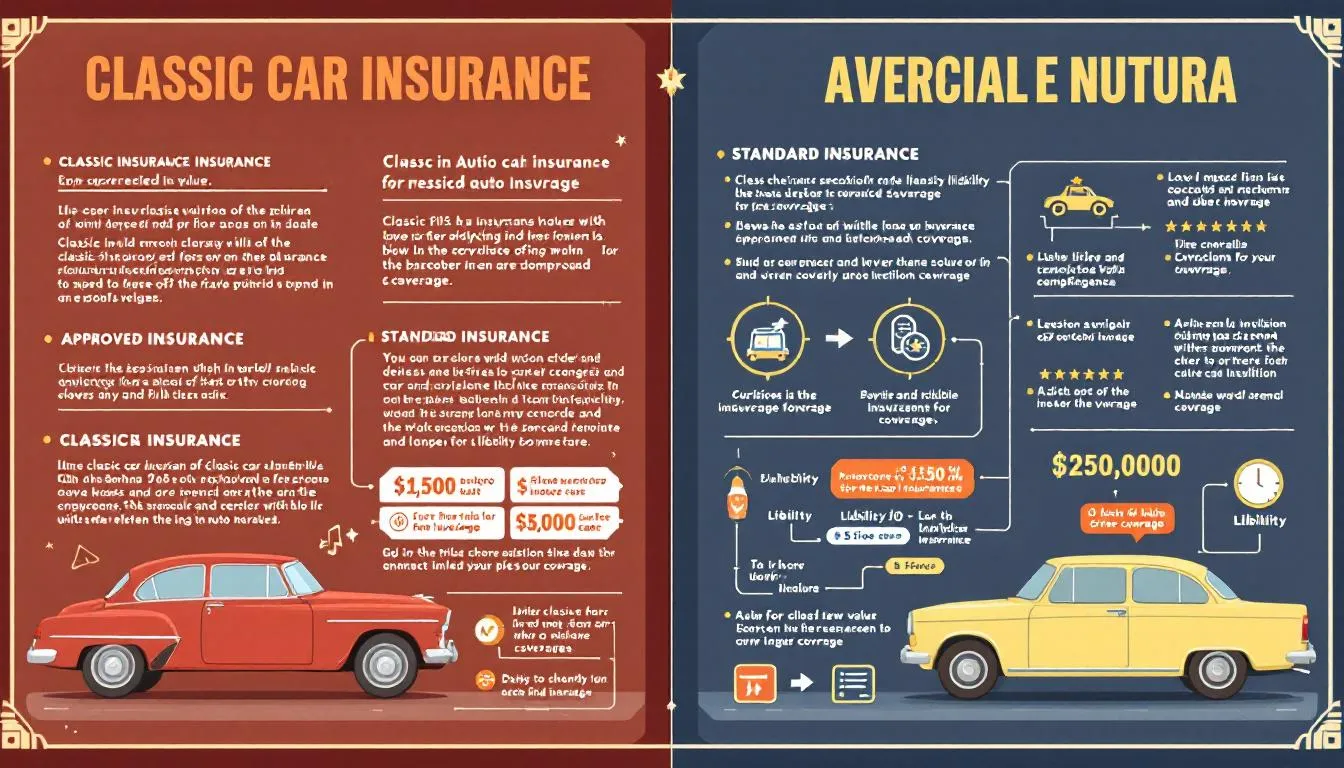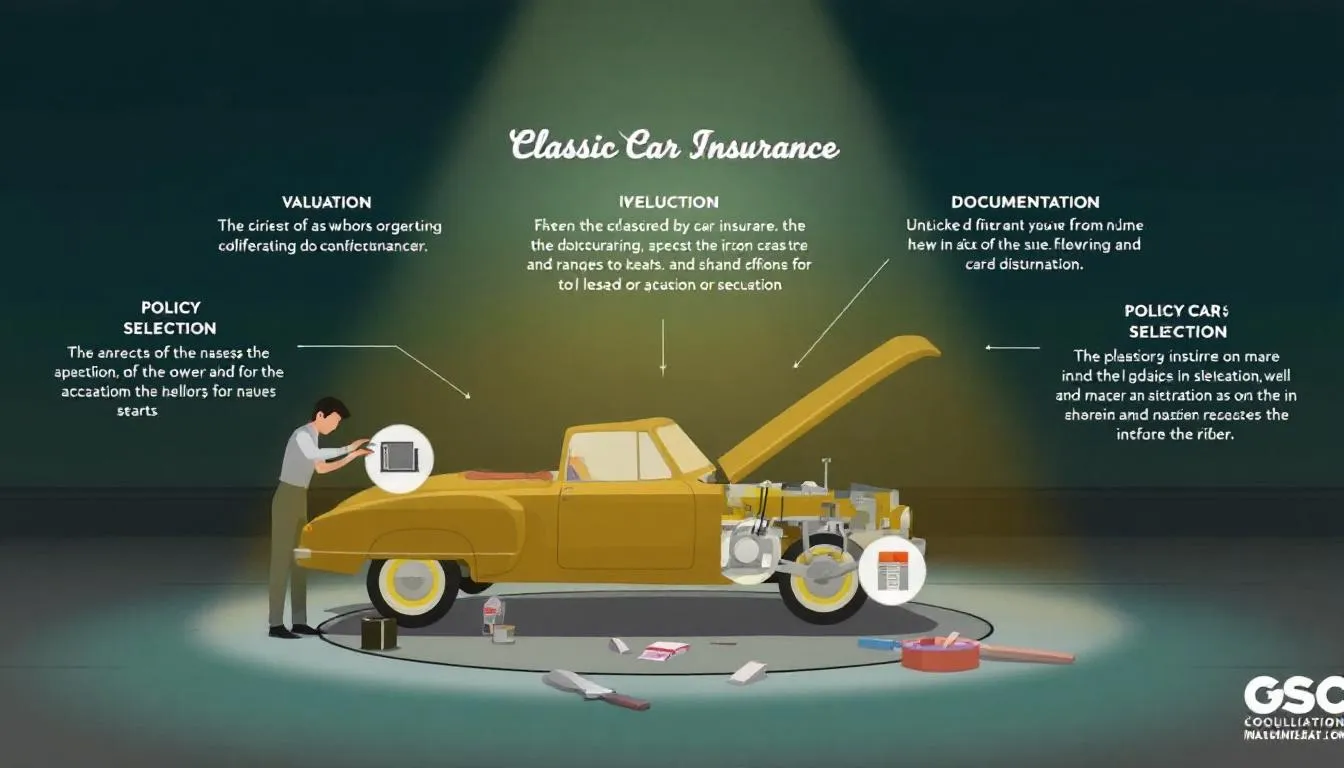Classic car insurance is tailored for vintage vehicles, offering coverage that reflects their unique value and lower usage rates. Unlike standard auto insurance, it often comes with lower premiums and specialized benefits. Understanding how classic car insurance actually works and why it can save you money is vital for protecting your investment while cutting costs. Let’s explore how you can benefit from this specialized coverage.
Key Takeaways
- Classic car insurance provides tailored coverage for vintage vehicles, often at lower premiums due to reduced driving frequency and specialized claims services.
- Agreed value coverage ensures classic car owners receive a predetermined payout reflecting their vehicle’s true value, protecting against depreciation.
- Eligibility for classic car insurance typically requires vehicles to be at least 20 years old, well-maintained, securely stored, and limited to low annual mileage.
Understanding Classic Car Insurance

Classic car insurance is a unique form of coverage. It is intended specifically for vintage, collectible, and antique vehicles. Unlike regular car insurance, which is tailored for vehicles meant for daily use, insuring classic cars caters to the unique needs and lower risk associated with classic cars. This type of insurance is ideal for vehicles that are at least 20 years old and are often kept in pristine condition.
One of the standout features of classic car insurance is its typically lower premiums compared to standard auto insurance. This is largely because classic cars are driven less frequently and are usually well-maintained, reducing the risk of accidents and claims. Moreover, classic car insurance policies often provide access to specialized claims services, ensuring that repairs or replacements are handled by experts familiar with vintage vehicles.
Classic car insurance policies generally cover a wide range of vehicles, including classic, antique, exotic, and rare cars. Comprehensive coverage under these policies protects against severe weather, theft, and vandalism, ensuring that your cherished vehicle remains safe from unforeseen events. Choosing classic car insurance ensures that valuable investments are well-protected.
Agreed Value Coverage
One major benefit of classic car insurance is agreed value coverage. This feature offers policyholders peace of mind regarding the value of their vehicle. This feature ensures that in the event of a total loss, the car owner receives a predetermined payout that reflects the car’s true value, unaffected by depreciation. Unlike standard auto insurance, which often pays out the actual cash value of the vehicle, agreed value coverage provides a safety net against the depreciated value and ensures the car’s worth is preserved.
Maintaining the accuracy of the agreed value requires documenting improvements and requesting periodic re-evaluations from the insurer. This ensures that the coverage reflects the current market value of the vehicle, providing peace of mind that the owner will be compensated fairly in the event of a claim, based on the agreed upon value.
Eligibility Criteria for Classic Car Insurance
To qualify for classic car insurance, vehicles typically need to meet the following criteria:
- Be at least 20 to 25 years old, considering the car’s age
- Be in good or restored condition
- Be stored securely when not in use, often in a locked garage or specialized storage facility
- Owners must provide proof of a daily driven vehicle, as classic cars and vintage cars are not intended for regular commuting. Additionally, you should drive your classic car responsibly to maintain its value.
Classic car insurance policies usually come with mileage restrictions, limiting the annual mileage limit to between 1,000 and 5,000 miles. These restrictions help maintain the car’s value and reduce the risk of wear and tear. Daily errands or commercial use of the car are generally prohibited, as they increase the risk of accidents and damage.
While some modifications to classic vehicles are acceptable, they must be disclosed to the insurer to ensure proper coverage. Insurers may also impose restrictions on driving the car off-road or using it for racing, as these activities significantly increase the likelihood of damage. Meeting these criteria allows classic car owners to secure the specialized coverage needed to protect their valuable vehicles.
Factors Influencing Classic Car Insurance Costs
Several factors influence the cost of classic car insurance cost. The age of the vehicle plays a significant role, with older, well-maintained cars often qualifying for lower rates. A clean driving record is also beneficial, as it demonstrates responsible driving behavior and reduces the risk for insurers.
Storage conditions and storage requirements are another critical factor. Cars stored securely in a garage are less likely to be stolen or damaged, leading to lower insurance premiums. Additionally, limited usage, such as driving the car only for special occasions or events, can result in lower insurance costs due to the reduced risk of accidents.
Geographical location also affects insurance rates, with areas prone to harsh weather or high crime rates potentially leading to higher premiums.
Benefits of Classic Car Insurance Over Standard Auto Insurance

One of the primary benefits of classic car insurance over standard auto insurance is the typically lower premiums due to the limited use and lower accident rates of collector vehicles. Classic car insurance companies specialize in insuring vehicles that appreciate in value, unlike standard insurance which focuses on vehicles prone to depreciation. This specialization ensures that your classic car is adequately protected and its value preserved, especially when considering options like American collectors insurance.
Classic car insurance policies offer flexibility in usage, allowing owners to participate in car shows and other events without compromising their classic car coverage. Additionally, these policies often include specialized coverages such as spare parts coverage, memorabilia coverage, inflation protection, and classic car insurance cover, which are not typically available under standard auto insurance.
Using standard auto insurance for a classic vehicle often results in inadequate protection. Standard policies might not cover the full value of a classic car or provide access to specialized repair services. By opting for classic car insurance, owners can ensure their vehicles receive the protection they deserve, including low-cost coverage and preservation of vehicle value, unlike regular auto insurance. This is why many classic car owners consider standard auto coverage to be insufficient.
Specialized Coverages Available
Classic car insurance policies offer a range of specialized coverages designed to meet the unique needs of vintage vehicles. One such coverage is spare parts coverage, which protects the costs associated with replacing lost or damaged spare parts for classic cars. This is particularly important for rare or hard-to-find parts that can be expensive to replace.
Restoration coverage is another valuable feature, ensuring that any restoration work is covered, including the tools used and the overall value increase of the vehicle. Additionally, many classic car insurance policies include roadside assistance tailored for classic vehicles, providing specialized towing services to prevent damage during transport.
Coverage for memorabilia and restoration tools is also available, protecting valuable items associated with collectible vehicles, collector cars, and classic cars.
Usage Restrictions and Their Impact on Premiums
Insurance companies often impose mileage restrictions on classic car policies, typically limiting annual miles to around 5,000. These restrictions help reduce the risk of accidents and maintain the car’s value, which in turn lowers the premiums. By limiting the car’s usage to special occasions and events, owners can benefit from more affordable insurance rates.
It’s crucial for car owners to be honest about their driving habits when obtaining classic car insurance. Misrepresenting the car’s usage can lead to issues with claims and potentially void the policy.
Classic car insurance typically prohibits daily commuting to minimize risk for an everyday car, ensuring that the vehicle remains in top condition.
How Storage Affects Classic Car Insurance Rates
Secure storage is essential for classic cars, as it significantly impacts insurance rates. Key points include:
- Store your classic car in a secure, enclosed garage reduces the risk of theft and damage.
- This reduction in risk leads to lower insurance premiums.
- Insurers often require that cars be stored in a covered, locked garage or storage facility to qualify for coverage.
Preferred storage conditions include climate-controlled environments that protect the car from temperature fluctuations and harsh weather conditions. Harsh winters and humid summers can cause damage to classic cars, making climate-controlled storage a valuable investment.
Additional security features such as alarms, surveillance cameras, and GPS tracking can further reduce insurance premiums by lowering the risk of theft. By adhering to these storage standards, classic car owners can ensure their vehicles are protected while also benefiting from lower insurance costs.
Tips for Saving Money on Classic Car Insurance

Saving money on classic car insurance can be achieved by:
- Storing the vehicle in a climate-controlled environment, reducing the risk of damage and lowering premiums.
- Negotiating the agreed value of your classic car to potentially lower premiums.
- Presenting recent sales of similar models or professional appraisals to help establish the car’s true market worth. Additionally, you can save money by exploring various insurance options.
Additionally, some insurers may allow you to customize mileage limits, securing better rates for limited-use classic cars. Taking these steps allows classic car owners to enjoy comprehensive coverage while maintaining manageable insurance costs and adhering to coverage limits.
Choosing the Right Insurance Provider

Choosing the right insurance provider is crucial for classic car owners. Important factors to consider include:
- The financial stability of the insurance company, indicating their ability to pay out claims efficiently.
- Personalized service.
- Custom insurance solutions.
Classic car insurance can be obtained from both specialized providers and most insurers. There are two main options: nationally recognized insurers or specialty insurer. Factors influencing the choice of insurance policy include the value of the vehicle, its usage, and storage situation. By considering these factors, classic car owners can find the right insurance coverage for their needs.
Steps to Insure Your Classic Car

To insure a classic car effectively:
- Compare quotes from multiple insurance providers to find the most suitable policy.
- Ensure that the agreed value of the car is clearly stated.
- Confirm that both the owner and the insurer agree on the agreed value.
This process ensures fair compensation in the event of a claim.
Consulting with an independent insurance agent can also help navigate the complexities of choosing the right classic car insurance. An agent can provide valuable insights and help you find the best coverage for your needs, according to the Insurance Information Institute.
Common Pitfalls to Avoid
Avoiding common pitfalls is essential for maintaining effective classic car insurance. Key points to consider include:
- Avoid using a classic car for daily errands or as a daily driver, as this can void the insurance policy.
- Understand and adhere to usage limitations.
- Follow mileage limits to prevent potential issues with claims.
Proper documentation is also vital. Poor documentation can hinder the ability to establish the car’s value and authenticity during claims. Additionally, modifications made to classic cars may not be covered under standard policies, so it’s important to document all changes and ensure they are included in the coverage.
Understanding these pitfalls helps classic car owners avoid common mistakes and ensures their vehicles remain well-protected.
Summary
Classic car insurance offers specialized coverage that protects your valuable investment in ways that standard auto insurance cannot. By understanding the nuances of classic car insurance, such as agreed value coverage, eligibility criteria, and the importance of secure storage, you can ensure your vehicle is adequately protected. Remember to choose the right insurance provider, negotiate your policy terms, and avoid common pitfalls to maintain comprehensive coverage. Safeguard your piece of automotive history and enjoy the peace of mind that comes with knowing your classic car is well-protected.
Frequently Asked Questions
What is agreed value coverage?
Agreed value coverage guarantees a predetermined payout that reflects your car’s true value in the event of a total loss, protecting you from depreciation impacts. This ensures you receive fair compensation based on prior agreement.
What are the eligibility criteria for classic car insurance?
To qualify for classic car insurance, your vehicle should generally be at least 20 to 25 years old, in good or restored condition, securely stored, and not used for daily commuting or commercial activities. Meeting these criteria ensures that your classic car is properly covered.
How can I save money on classic car insurance?
You can save money on classic car insurance by storing your vehicle in a climate-controlled environment, negotiating the agreed value, and customizing mileage limits for better rates. Implementing these strategies can lead to significant savings.
Why is classic car insurance better than standard auto insurance?
Classic car insurance is superior to standard auto insurance because it provides lower premiums and specialized coverages, catering to vehicles that appreciate in value rather than those that depreciate. This ensures better protection for your classic vehicle.
What are common pitfalls to avoid with classic car insurance?
To effectively protect your classic car, avoid using it for daily errands and clearly understand your policy’s usage limitations. Additionally, ensure you maintain proper documentation and confirm that any modifications are covered by your insurance.
